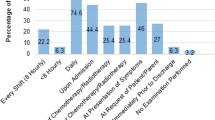Abstract
The object of this work was to conduct a rapid assessment of a teaching hospital's promotion of optimal oral health among its chemotherapy patients. A pilot study was undertaken, which included focus interviews with oncology clinic staff, a review of the fellowship training curriculum, and unobtrusive observations in the clinic setting. Charts were also audited for oncology patients who were probable chemotherapy candidates. A review of the data offered no evidence that oral health care was routinely addressed in a preventive context prior to the initiation of chemotherapy. Promotion of oral health care will help reduce the risk of oral sequelae of chemotherapy for patients and the subsequent impact of the oral sequelae on patients' chemotherapeutic regimen, thereby improving patients' chances of survival and improving their quality of life. Other teaching hospitals may wish to conduct a similar rapid assessment to determine whether they too could improve patient care and professional education in this area by incorporating pre-chemotherapy oral health evaluation and treatment into routine care for cancer patients.
Similar content being viewed by others
Author information
Authors and Affiliations
Additional information
Published online: 18 November 1999
Rights and permissions
About this article
Cite this article
Sadler, G., Oberle-Edwards, L., Farooqi, A. et al. Oral sequelae of chemotherapy: an important teaching opportunity for oncology health care providers and their patients. Support Care Cancer 8, 209–214 (2000). https://doi.org/10.1007/s005200050287
Issue Date:
DOI: https://doi.org/10.1007/s005200050287




